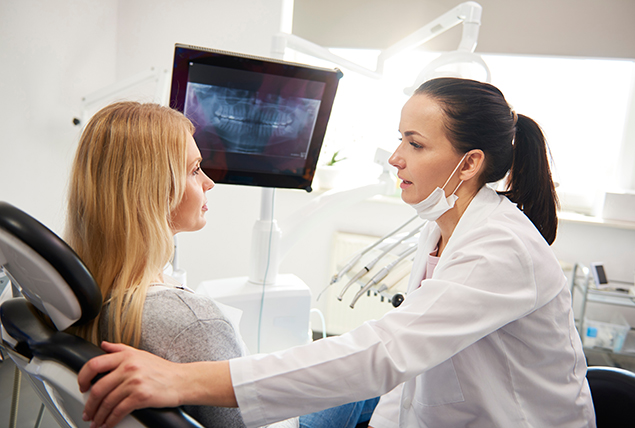How Menopause Affects Your Dental Health

Menopause's common side effects, such as hot flashes, "brain fog" and changes in sex drive, get a lot of press. However, you may experience oral health conditions during your menopausal transition as well.
Women going through perimenopause are prone to oral sensory complaints, such as altered tastes and burning sensations in the mouth, according to a 2021 study published in the medical journal BMC Women's Health.
"Common dental issues with menopause are tooth sensitivity, dry mouth and an increased risk of developing cavities. Women may also experience a decrease in salivary flow, which can lead to an increase in plaque and bacteria buildup in the mouth," added Kasen Somana, B.D.S., M.Sc., a digital cosmetic dentist and founder of Signature Dentistry in Toorak, Australia.
With the help of experts, let's talk about some of the oral health conditions you may experience during menopause.
Hormones and your oral health
First, let's briefly discuss why menopause affects your oral health. Your mouth contains estrogen receptors, which means changes in estrogen levels affect your whole body, including your mouth, teeth and gums.
"As hormone levels shift during menopause, all parts of a woman's body, including oral health, are impacted. In particular, as the female sex hormones estrogen and progesterone decrease, it affects aspects of your oral health," confirmed Jeff Rappaport, D.D.S., chief dental advisor at quip, an oral care company headquartered in Brooklyn, New York.
"The teeth and gums are extremely susceptible to any hormonal changes that take place just before menopause," stated the authors of a 2013 comprehensive review published in the Annals of Medical & Health Sciences Research. These changes decrease the body's ability to fight minor infections and maintain a healthy balance of good and bad bacteria in the mouth.
Your mouth health is impacted by hormone fluctuations during other life stages as well, including:
- Puberty
- Menstruation
- Pregnancy
Oral health conditions during menopause
Let's take an in-depth look at a few of the mouth, tooth and gum conditions you may encounter during the menopausal transition and the treatment options available.
Dry mouth
Dry mouth, or xerostomia, is a condition that occurs when your salivary glands don't produce enough saliva to keep your mouth moist, according to Mayo Clinic.
"Dry mouth during menopause is a common symptom because of the hormonal changes associated with the condition," Somana stated. "Lower levels of estrogen can reduce the production of saliva, which can lead to a dry mouth. Menopausal women often experience anxiety, stress and depression, which can also contribute to dry mouth."
Treatment of dry mouth can include mouth rinses or mouth moisturizers to keep the mouth lubricated. Mouthwashes specifically designed for dry mouth are available over the counter and by prescription.
Burning mouth syndrome
"Burning mouth syndrome is a medical condition characterized by a burning sensation in the tongue, lips and other areas of the mouth," Somana explained. "It is more common in women than in men, and is more likely to occur in women who are going through menopause due to the hormonal changes and other symptoms associated with the condition."
"It is often associated with women during menopause primarily due to the lower amounts of estrogen levels being produced during this phase of life," Rappaport added.
Treatments including benzodiazepine, antidepressants, analgesics, capsaicin, alpha lipoic acids and cognitive behavioral therapy (CBT) have proved effective.
Bleeding gums
"Bleeding gums is a sign of gum disease, gingivitis, which will progress to periodontitis if nothing is done about it," explained Leena Palomo, D.D.S., M.S.D., professor and chair of the Ashman Department of Periodontology and Implant Dentistry at the New York University College of Dentistry.
"That bleeding is a sign of inflammation and will spread to the bony socket that holds the tooth in place, if not reversed with care," Palomo said. "And if the bony socket starts to become compromised, it cannot support the tooth. Teeth can develop abscesses or be lost as a result."
Gingivitis and periodontal disease
Hormonal changes can cause the gums to become more susceptible to plaque buildup, which can lead to gingivitis and periodontal disease (gum disease).
Nearly 98 percent of postmenopausal women believed they had healthy gums in a 2013 study led by Palomo and published in the Journal of Indian Society of Periodontology. In reality, 36.2 percent of the study participants had severe periodontitis, 26.6 percent had moderate cases and 34 percent had mild periodontitis.
Up to 50 percent of periodontal disease goes undiagnosed because periodontal issues are often not painful until they are at an advanced stage, according to the study authors. Brushing twice a day, flossing and regular dental visits can help prevent gum disease.
Jaw bone density
"Some research suggests hormonal changes affect the bony socket holding the teeth in place, in a similar way that osteoporosis takes away skeletal bone mass, and other research suggests other types of hormone-regulated shifts in oral bacteria balance or a body's immune response to that bacterial balance," Palomo explained.
"What is known for sure is that you do not want plaque or tartar kick-starting the body's immune response, called inflammation, if the jaw bone may already be more susceptible to thinning out," Palomo continued. "While the research may not have all the answers yet, being vigilant with what we can control is a great strategy."
Treating dental health issues during menopause
It's important for women to stay on top of their oral health at all times, but especially during times of hormonal fluctuation, such as menopause. How can a woman in the menopausal transition best care for her dental health?
"Two words: Be vigilant," Palomo stated.
She provided the following tips for keeping your teeth, gums and the bones of your mouth healthy:
- Be vigilant in preventive home care. Brush two times a day for two minutes each time with a soft bristle toothbrush, and it's very important to floss daily.
- Be vigilant with your dental checkups and professional cleanings. Dentally healthy people should see their dentist at least twice a year, but those who face challenges to their teeth or supporting structures, such as bones and gums, should visit the dentist four times a year.
- Be vigilant in speaking up. Tell your dentist right away if you notice changes such as bleeding gums, pink on your toothbrush bristles or teeth shifting.
- Be vigilant in sharing your medical history and medications. If your physician suspects a disease like osteoporosis or autoimmune disease, for instance, or starts you on a new medication, tell your dentist.


















